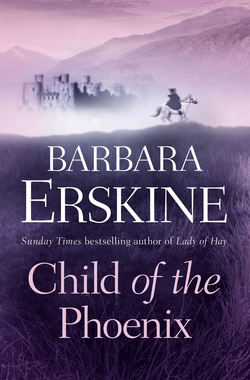Читать книгу Child of the Phoenix - Barbara Erskine - Страница 100
VII CHESTER CASTLE April 1233
ОглавлениеThe Welshman pulled his rough sheepskin cloak around him and peered furtively over his shoulder. It was some time since he had passed the coin to the servant and asked for the Lady Rhonwen. Behind him the sun had set into a bank of crimson cloud and the cold wind was rising, blowing steadily from the north. With the earl and countess away, the castle was strangely empty. The garrison remained; the administrative officers were still there, but the rest of the great household had moved on to progress around Lord Chester’s vast estates.
It was nearly dark before she came, muffled as he was against the cold. They stood in the shelter of the stable block and talked for a few minutes in hurried Welsh. A letter passed between them, then some coins, and the Welshman faded back into the night. At first light, when the gates opened, he would be gone on the journey back to Degannwy.
Rhonwen tucked the letter into her bodice and retraced her steps back to the women’s bower. There were fewer ladies there now; those who served the aged dowager and the chatelaine and two young women near to giving birth, that was all. It was comparatively easy to find a secluded corner and settle with her flickering candle to read the letter which Gruffydd had written to Eleyne.
Cautiously worded though it was, it was clear in its message. Gruffydd had had meetings with his father and at long last Llywelyn was talking of allowing his eldest son his freedom once again. There had even been a vague promise that Gruffydd would be given the Lleyn Peninsula and that he would be allowed to work again with Dafydd if he would recognise Dafydd as his father’s heir.
Rhonwen dropped the letter on to her lap and gazed unseeing at the heavy wooden shutter which had been pulled across the window. If only he had the sense to agree; to bide his time. She sighed and pulled from her gown her other letter. There had been two that day, both addressed to Eleyne. This one had been carried by a messenger in the livery of the Prince of Aberffraw. He had been reluctant to give it up to her; he had been paid and well paid to put his letter into the hands of the Countess of Chester and no other, but in the end he had relented. Did not everyone know that the Lady Rhonwen was the countess’s nurse, her friend, her confidante? She could be trusted to pass on the letter the quickest way possible.
Reading it again now, Rhonwen frowned. Einion’s hand had grown feeble; his writing shook and strayed across the roughly scraped parchment, but the urgency was clear. He wanted Eleyne to return to Mô n.
Rhonwen frowned again. Eleyne had summoned her to her chamber once when the earl had ridden out for the day. They had hugged one another as they had when Eleyne was a child.
‘I am his wife now, Rhonwen,’ Eleyne had whispered, her eyes shining, ‘really his wife.’ She caught Rhonwen’s hands. ‘Oh Rhonwen, I love him so much. Give me time. Please. He will grow to like you. I know he will.’ Rhonwen had suppressed the agonising pang of jealousy which Eleyne’s words had caused her, melting before the excited pleading eyes, and she had not, as she had never, been able to deny Eleyne what she wanted.
‘I’ll wait, cariad,’ she had said, hiding her sadness. ‘I’ll keep out of his way, and wait.’ Nevertheless she had been hurt by Eleyne’s attitude in those last few weeks before they left on their progress around the country. It was as if Eleyne had forgotten her existence. But Rhonwen had watched and waited and kept out of the earl’s way as she had promised. And when the time came for the household to leave Chester she had shaken her head and pleaded exhaustion and told Luned to wait on Eleyne with extra care.
She looked down at Einion’s letter again: it must be important. Einion would never summon Eleyne back unless he felt it was vital; Einion, to whom she had entrusted Eleyne as she would have trusted herself; a man she respected and honoured more even than she honoured the prince. To disobey him would be to disobey the wishes of the gods; to obey him would be to reclaim Eleyne from her husband; to travel with her once more to Gwynedd; to go home.
She walked slowly across the room, her skirts catching in the dried, dusty herbs strewn upon the ground, her eyes shining. These two letters gave her the power to summon Eleyne back, to bring her home. She stood for a long time before the fire, unaware of the eyes of the other women looking up from their spinning and sewing and watching her warily. Her temper had grown uncertain in the weeks since her return from Gwynedd, her arrogance more defensive. Her beautiful face was drawn now and thin, her eyes haunted, and she seemed unaware of the women around her.
What would Eleyne want her to do? Would she want to go back to Gwynedd and the convoluted politics of her brothers’ quarrels, and to Einion, or would she want to remain with her husband, a countess touring her estates? She pictured Eleyne’s face yet again: the shining eyes, the knowledge of something which Rhonwen would never know, and she heard again her voice: Oh Rhonwen, I love him so much, and she knew what she must do.
Slowly and deliberately she dropped the two letters on to the fire and watched them shrivel and blacken in the heart of the flames.
